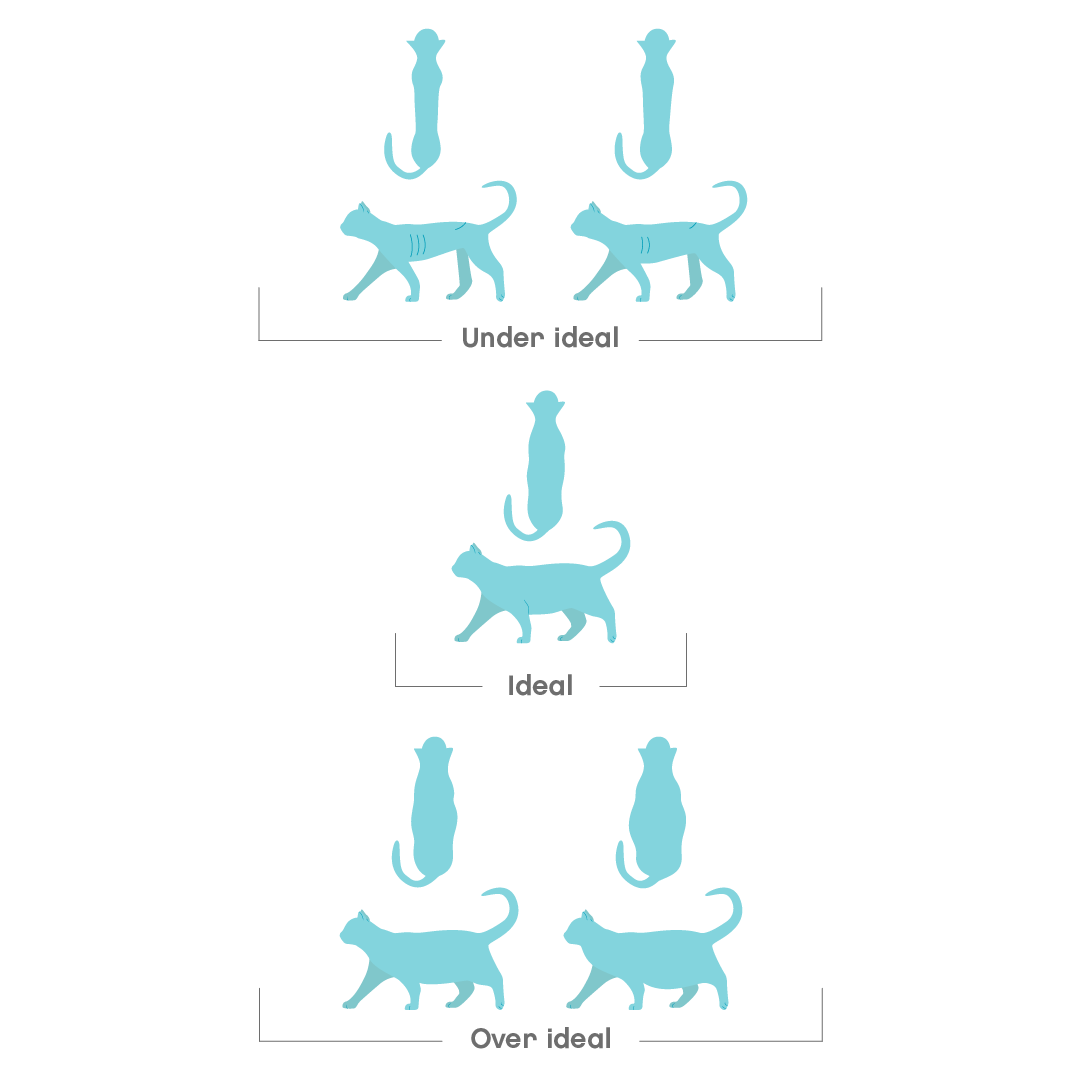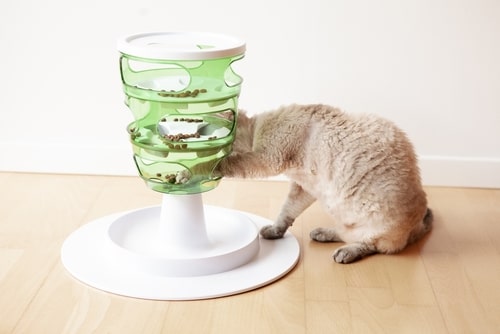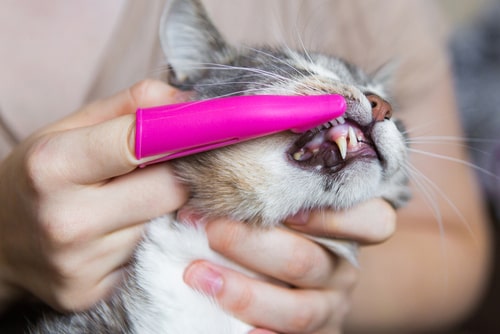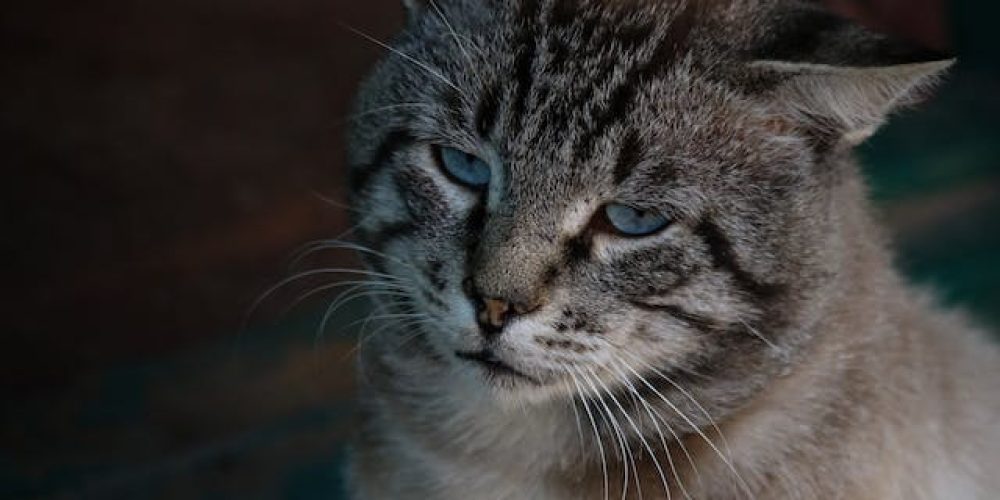Cats are considered senior at around 10 years old. Geriatric is then used from around 15 years onward. The average life expectancy for cats in the UK is 14 years, though it is slightly lower than this for purebred cats.
Things to look out for when you have a senior cat
As your cat progresses into their senior years, you may notice both behavioural and physical changes. It’s important to be aware of what may be normal or the signs of something else going on that may need to be checked by your vet.
Behavioural changes
- Becoming less active and playful can be fairly common in senior cats. If there are any signs of aggression, pacing at night, or lethargy, then this is usually an indication of an underlying problem, such as pain.
- Cat’s can develop signs of dementia, similar to the condition in humans. Signs of this include meowing more, confusion, and house soiling.
- If your cat’s behaviour changes, it’s best to speak to a vet. There is often an underlying problem, and many can be helped with medication, supplements, and lifestyle changes.
Physical changes
- As cats age, it’s normal for them to lose a little bit of weight, muscle, and body condition over a period of time. Sudden weight loss may indicate there are more severe problems.
- Appetite changes are common in senior cats, and it can be normal for them to eat slightly less than previously. If your cat seems to be constantly hungry or there’s a sudden decline in their appetite, speak to a vet to determine if they need a check-up and any tests.
- Drinking and urinating more than normal can be a sign of an underlying disease in the kidneys, liver, or other organs.
- Vomiting, diarrhoea, or constipation in senior cats can indicate an underlying disease. Most cases of an upset stomach should clear within 24-48 hours. If the symptoms persist longer or are severe, then it’s best to speak to a vet.
- Stiffness after rest, limping, and reluctance to jump are all signs of pain. Arthritis is extremely common in senior cats, and there are many treatment options.
- Urinary infections, blockages, and stones are more common in senior cats compared to incontinence. There are several treatment options available to help with the symptoms; speak to a vet to find out more. Urinary blockages are a severe, life-threatening condition in male cats.
Eyesight changes
- Loss of vision in senior cats is a common problem and can vary from mild loss of sight to total blindness.
- Cataracts, ageing changes, and high blood pressure are common causes of blindness in cats. Most cats cope well with loss of eyesight, especially when it happens slowly. However, it’s best to get a full check-up with your vet if you notice changes to your cat’s vision. There may be underlying problems, such as diabetes or heart conditions.
Hearing changes
- Long-term ear infections, ageing changes, and other causes can lead to hearing loss in senior cats. Most cats tend to cope well with a slow deterioration in their hearing, as they can still feel vibrations around them. Care must be taken around cats with hearing loss, as they may get easily startled. Avoid sudden movements, and always approach them from where they can see you.
Immune system
- As cats age, they become more susceptible to disease due to a weaker immune system. Infections, such as cat flu, can cause more severe symptoms in senior cats compared to younger cats.
- Wounds can take longer to heal in senior cats, especially if they have diabetes or other chronic diseases.
Our Joii vet team are available 24 hours a day for advice. If you have any questions about your cat, whether physical or behavioural changes, download the app and speak to a vet in the comfort of your home.
How to care for your senior cat
What to feed a senior cat
Cats’ nutritional needs change as they progress through their life stages, from kittens to adults to seniors. These needs also depend on how active they are, what breed they are, and whether they are neutered or not.
It’s harder for senior cats to digest fat and protein, so it’s advised to aim for foods that are easily digestible with high-quality protein.
Warming the food and offering smaller, more frequent meals can help improve the appetite of some cats.
There are specifically made diets for cats with medical issues such as arthritis, dental, or kidney disease.
It’s important to aim for a healthy weight and body condition score throughout your cat’s life, especially when they are in their senior years. Overweight cats are more prone to arthritis, diabetes, and heart disease, among others.
Body Condition Scoring (BCS) in cats
Body Condition Score (BCS) is a scale that gives a practical evaluation of the fat coverage of your cat’s body. By checking how easy or not it is to feel certain bony areas of the body, a score is then produced. There are several scales, from 1 to 5 or 1 to 9. The ideal body condition lies in the middle, so either 3/5 or 5/9.
The body areas normally checked for fat coverage are:
1. ribs and spine
2. hips and shoulders
3. waist

Here are a few tips on how to do it.
With your pet in a standing position:
- Place your hands on the rib cage and gently feel for each rib, without pressing too hard
- Feel the waist and look from the top and the side (if you have a very furry breed, it may be harder to assess)
- Feel the spine, which runs down the middle of the back
- Feel the top of the hips and shoulders
Exercise and mental stimulation
Physical and mental stimulation is very important for senior cats. Daily interaction with them and puzzle toys or feeders help to keep the brain active. Many senior cats prefer horizontal scratching posts rather than vertical posts, as they are easier to use.
Ageing changes causing confusion can put them at risk of getting lost. If your cat shows signs of dementia, it’s best to keep them indoors, as long as it doesn’t cause them stress.

Regular vet check-ups
We recommend getting your senior cat a vet checkup at least every 6-12 months. A full physical exam is important to check for body changes, including bad teeth and weight changes, and to identify any lumps or bumps that are not obvious to pet owners.
Senior blood tests are a good way to keep an eye on abnormal changes in the kidneys, liver and other organs in the body. Ideally, once a year, but more often if they are diagnosed with or develop signs of these diseases.
Senior cats usually need their nails trimmed more often than younger cats, and their nails are usually thicker.
Preventative healthcare, which includes vaccinations and parasite control, is still very important for senior cats. Make sure your cat is microchipped and the details are up-to-date, especially if they go outdoors.
Home adjustments
Feed your senior cat in a quiet area, somewhere they do not have to compete for their food. Make sure food and water bowls are easily accessible and not somewhere they have to walk far or get upstairs to reach. It’s recommended to have several water bowls available in separate areas of the home.
Older cats need more rest; make sure they have a quiet, warm, and safe area to sleep. Access to multiple litter boxes that are large, shallow, and in quiet areas of the home is recommended for senior cats.
Other household changes that can improve safety for your senior cats include anti-slip mats, padded beds, covering sharp edges, and using ramps.
Keeping a regular routine can help prevent stress and anxiety in senior cats. Try to keep mealtimes regular, avoid moving their belongings to new areas, and avoid leaving them alone for long periods of time.
Grooming
Chronic pain causing stiffness and reduced mobility leads to skin and coat changes in senior cats. The build-up of mats is more common as cats age. Daily, gentle brushing can help reduce this. If the mats start to spread over the whole body or are very deep, then a professional groomer or vet will be able to help remove them. Make sure to check your cat’s skin and coat daily for any abnormalities.
Dental care
As dental disease is so common in older cats, try to maintain a good oral hygiene routine from a young age, where possible. Tooth brushing is one of the most effective ways to keep your cat’s teeth clean, followed by dental diets and dental wipes. Dental disease can cause a lot of pain in cats, and if left untreated, it can also contribute to kidney or heart disease.

Be patient with your cat as they grow older; it can be a sudden, big change, and it will take time for you and for them to adapt. Some cats may want more space, whereas others may seek attention. It’s important to follow their lead. Read more in our article about the common health problems in senior cats.
Our Joii vets are available 24 hours a day for advice and to help with any questions you have about caring for your senior cat.











